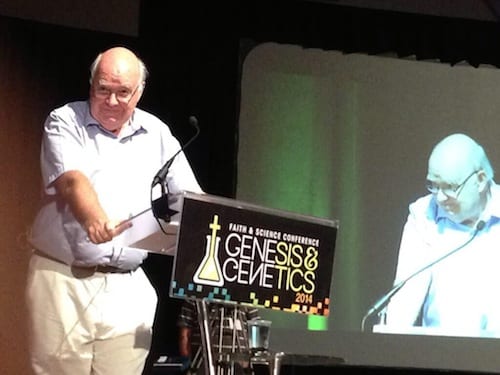 Faith & Science
Faith & Science
John Lennox in Springfield, MO: No, Evidence and Faith Are Not a Contradiction in Terms

I’m here in Springfield, MO, where our friend the Oxford mathematician John Lennox gave the opening plenary talk to the 2014 Faith and Science Conference: Genesis and Genetics. With his famous wit, dynamic style, and lyrical Irish brogue, Lennox demonstrated for this highly engaged crowd of over three hundred that the supposed conflict between faith and science is a fiction. One of the sources of this familiar myth, Lennox said, is that the culture has re-defined faith to mean “blind faith,” a notion he utterly rejects. “It is not blind faith,” he said, “it is evidence-based faith.”
Lennox pointed out that atheists have a belief system too, that is to say a faith. He recounted an exchange he once had with bioethicist Peter Singer. Singer asked him, “Were your parents Christians?” When Lennox replied that they were, Singer said that was one of his problems with religious belief: children tend to adopt the faith of their parents. So, Lennox asked Singer, “Were your parents atheists?” Singer replied that they were. “Well, so you adopted your parents’ faith!”, Lennox replied. “No,” Singer answered, “because atheism is not a faith. It denies faith.” To which Lennox quipped, “Really? I thought you believed it!” That little story made the point very well.
Lennox went on to talk about how fields like cosmology and evolution deal with questions of ultimate reality. It is not legitimate just to assume naturalism. He gave examples of how science supposes information to actually exist, though information is obviously immaterial. He asked, “What about the mind that does the science?” He cited Darwin’s own “horrid doubt” that if the human mind did indeed evolve from lower forms, how can we trust its power to reason? “Unless human reasoning is valid, science cannot be valid,” Lennox said.
After the talk, there was time for some Q&A and judging from the questions, it was clear the audience was both excited and challenged by Lennox’s remarks.
So too at the afternoon plenary session, lead by Steve Krstulovich, a particle physicist with Fermilab. He gave a good overview of the current state of particle physics and cosmology, citing new research on string theory, gravitational waves, and black holes. About string theory, Krstulovich said, “At Harvard, string theory was called ‘postmodern physics.’ If there was to be no more reliance on experiment to check theories, and math sufficed to explore laws of nature, we had entered the period of postmodern science.”
He went on to observe:
Some sociologists and those in the humanities have claimed that the scientific community is no more rational or objective than any other community of human beings. They argue that claims about how science works are mainly propaganda designed to intimidate people into giving them power, and they say that science is driven by the same political and sociological forces that drive people in other fields.
All of this was background to his larger point that despite all we have learned about the cosmos, despite the many theories that seek to explain it, there is a general feeling that we’re missing something really big, something really important. What that is something might be is very much on the agenda at this conference.
I’m on Twitter. Follow me @DonaldM75.
